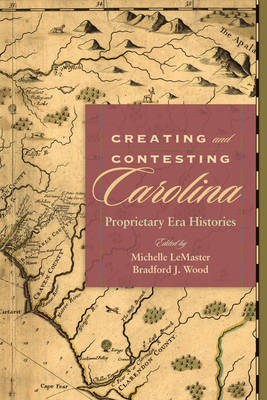
- Retrait gratuit dans votre magasin Club
- 7.000.000 titres dans notre catalogue
- Payer en toute sécurité
- Toujours un magasin près de chez vous
- Retrait gratuit dans votre magasin Club
- 7.000.0000 titres dans notre catalogue
- Payer en toute sécurité
- Toujours un magasin près de chez vous
Creating and Contesting Carolina
Proprietary Era Histories
74,95 €
+ 149 points
Description
The essays in Creating and Contesting Carolina shed new light on how the various peoples of the Carolinas responded to the tumultuous changes shaping the geographic space that the British called Carolina during the Proprietary period (1663-1719). In doing so, the essays focus attention on some of the most important and dramatic watersheds in the history of British colonization in the New World. These years brought challenging and dramatic changes to the region, such as the violent warfare between British and Native Americans, struggles between the British and the Spanish, the no-less dramatic development of the plantation system, and the decline of proprietary authority. All involved contestation, whether through violence or debate. The very idea of a place called Carolina was challenged by Native Americans, and many colonists and metropolitan authorities differed in their visions for Carolina. The stakes were high in these contests because they occurred in a world often characterized by brutal warfare, rigid hierarchies, enslavement, cultural dislocation, and transoceanic struggles for power. The peoples of the early Carolinas reimagined places, reconceptualized cultures, realigned their loyalties, and adapted in a wide variety of ways to the New World. Three major groups of peoples-European colonists, Native Americans, and enslaved Africans-shared these experiences of change in the Carolinas, but their histories have usually been written separately. These disparate but closely related strands of scholarship must be connected to make the early Carolinas intelligible. Creating and Contesting Carolina brings together work relating to all three groups in this unique collection.
Spécifications
Parties prenantes
- Editeur:
Contenu
- Nombre de pages :
- 400
- Langue:
- Anglais
- Collection :
Caractéristiques
- EAN:
- 9781611172720
- Date de parution :
- 01-11-13
- Format:
- Livre relié
- Format numérique:
- Genaaid
- Dimensions :
- 152 mm x 229 mm
- Poids :
- 752 g

Les avis
Nous publions uniquement les avis qui respectent les conditions requises. Consultez nos conditions pour les avis.





